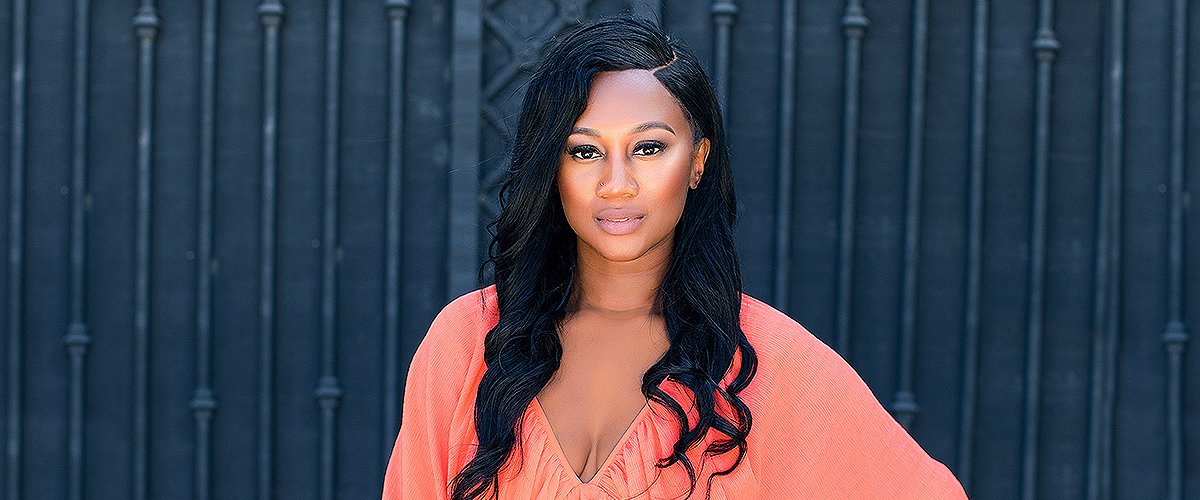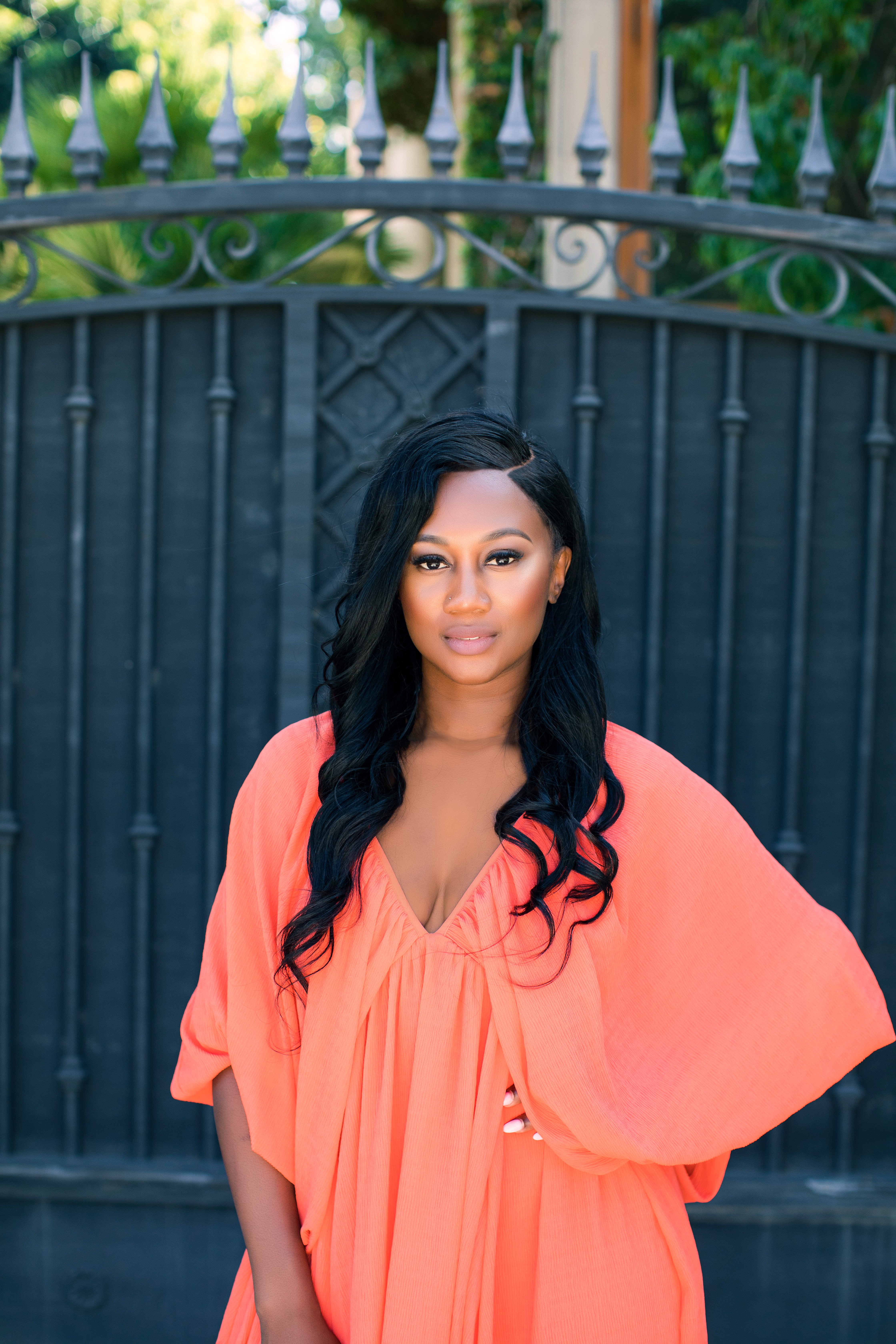
Exclusive: Fox 11's 'Culture Conversations' Host Mimi Brown on Sharing Black Stories & Life as a Mom
As the U.S. got immersed in protests after the murder of George Floyd at the hands of the Minnesota police, one young woman working behind the scenes at FOX 11 realized more needed to be done to highlight the black experience in the network.
Mimi Brown, a mother of one that hails from Alaska, with a career of over 15 years in the broadcasting industry, has now stepped into her role as the host of FOX 11's digital talk show "Culture Conversations."
There, she's joined weekly by black personalities from all walks of life to discuss race, inequality, justice, policing, and other issues that affect the black community.

Mimi Brown, host of FOX11's digital show "Culture Conversations" | Photo courtesy of Mimi Brown
Brown has now interviewed prominent personalities such as Ms. Tina Lawson, gospel singer Kirk Franklin, Amanda Seales, and Master P, to name a few.
"Black People don't want a handout; we just want an equal playing field."
Her first introduction to the industry came when, after graduating from Howard University, she got a call from Omarosa Manigault, who had been her professor, to work as her assistant in Los Angeles.
Brown didn't think twice before accepting the offer, and as she landed in the city of angels, many other doors started to open for her in the entertainment industry.
Her first job was as a red-carpet interviewer, and then, she went on to land a position as a producer in FOX 11's morning show "Good Day L.A." in 2006.
However, it hasn't been a smooth ride for Brown. After a few years of working with FOX11, she was among 200 people the network laid off in 2009.
Not one to give up, Brown put her skills as a news writer to good use working in other local stations like NBC4 and KTLA. Seven years later, she was re-hired at FOX11.
It was her knack for sharing the best inspiring stories she could find—from celebrities and ordinary people—that drove Brown to have an honest conversation about race with her co-workers.
In the end, her news director decided there was more the network could do to highlight black voices, and Brown was the perfect person to be at the forefront of that new movement.
Here, Mimi Brown tells us more about her motivations, her life before arriving in the industry, her time working with Omarosa, and what we can expect in the future from this brilliant young woman.
ON LIFE BEFORE JOURNALISM
Q. Hi, Mimi. Thank you for taking the time to talk with us. First, could you give us a glimpse into your early life and family? How was it growing up in Alaska as a black girl?
A. Growing up in Alaska was really unique! My family life was amazing. My dad loved camping and fishing and always took my mom, sister, and me along.
So, I spent my early days surrounded by nature, camping, hiking, fishing. I never really knew I was "Black" growing up. There was never really any difference made at any time during my early childhood, and I went to a private school.
When I arrived at high school, I started to realize I was the only one in most of my classes.
Q. How is your relationship with your parents? What is the best piece of advice you've received from them?
A. They are my biggest supporters! They've both encouraged me to never give up, and the sky is the limit to reach for my dreams. My dad reminds me that I said I wanted to be a news reporter as a child, and I'm now accomplishing those dreams.
Q. How did you decide you wanted to pursue a career in broadcasting journalism? Did you ever consider another career path? Who's a figure that inspired you to pursue this career?
A. I feel like I came to the decision to pursue a career in journalism later in life. I have a Degree in Business Administration from Howard University because I wasn't sure what I wanted to do.
After graduation, I landed a job at U.S. Weekly Magazine and started interviewing celebrities on the red carpet, and it sparked my interest in Journalism.
Q. Omarosa was your professor at Howard University, and you've said before that it was a call from her to work as her assistant that set you on the right track after landing in L.A. What is the most important lesson you learned while working with such a public and influential figure?
A. After I graduated, I was sure what I wanted to do. Omarosa had just finished on "The Apprentice," she called me in Washington DC and asked me to move to L.A.
Sometimes, I am still shocked I actually made the leap because I am not that spontaneous! But that's how I know it was part of my destiny to move here because I didn't think twice about the request.
I learned so much during those early days working with O, but I think one of the biggest lessons I learned is it doesn't matter how the world sees you — it only matters how you see yourself. Never let an outside influence determine who you are.
Q. One of your first jobs in the industry was as a red-carpet reporter. Do you remember the first celebrity you interviewed? Is there any relevant memory you have from those awards ceremonies, be it a funny or unexpected one?
A. Wow! No one has ever asked me that, that is a great question! Do I remember the first celebrity I interviewed… Hmmm, I'm pretty sure it was Robin Thicke. It was for a celebration honoring DJ AM, may he Rest in Peace.
To be honest, being a red-carpet reporter was like journalism book camp 101. You had to be tough, have thick skin, and not be afraid to get aggressive to get what you need. It was a learning experience.
ON WORKING AT A MAJOR NETWORK
Q. How was your transition from red-carpet reporter to a producer on "Good Day L.A."?
A. I actually met a cameraman who worked at "Good Day LA" on the carpet one day. I asked him if he could help me get in at the station. He gave me his number and set up an interview for me with the News Director, Jose Rios. We hit it off, and he hired me!
My first producing job was amazing. I produced lifestyle pieces for a segment called Lisa's L.A. My job was to find the newest and hottest restaurants, fitness crazes, clothing stores, and hair salons. I couldn't believe I was getting paid to do what I would have done for free!
Q. As a woman, what is the biggest challenge you've encountered working for a major network?
A. I think as a woman working in any industry, you often have to prove that you can do the job just as good as any man. I don't think it's specific to working for a major network, I find that you have to prove yourself and work twice as hard just to get the same recognition.
My biggest challenge has been "waiting my turn" for things I knew I was capable of and ready to take on, but it grew my patience and resilience, and for that, I'm grateful.
Q. How did the #MeToo movement affect your views about the industry?
A. As a woman who has worked in the entertainment industry, I was not shocked or surprised by the things I heard during the #MeToo movement.
I've had people hit on me and promise me things not necessarily at Fox but just working in this field looking for other opportunities.
I think you have to stay grounded and trust that your work ethic, drive, and determination will get you where you're going. There are no shortcuts in life.
That has always been my motto, so the #MeToo movement did not change my views; I already knew what the industry was like.
Q. You're passionate about sharing Black stories. As a producer, was it hard to highlight Black voices in FOX11? What are some of the challenges and trials you had to overcome when pitching these stories?
A. I think the station has done a really good job with listening and allowing me to take the reins on this one. They defer to me and give me the space to be able to tell these stories and amplify our voices.
In the beginning, I think the challenge was having to over-explain why someone should be highlighted, but after showing and telling, they ultimately left the decision up to me.
ON "CULTURE CONVERSATIONS" & OTHER PROJECTS
Q. "Culture Conversations" was created in the aftermath of George Floyd's death and the protests that erupted in the country. Could you tell us how the idea came to be initially and what the show is about?
A. I had a very open and honest conversation about race with my co-workers for the first time ever. After that call, I think we all knew there was more that we could do.
As a station, people turn to us to highlight what is going on in the world, and we knew we needed to be on the right side of justice.
Our News Director, Erica Hill-Rodriguez, is a risk-taker, and I applaud her for it. She stepped out after that meeting and called me, and we came up with an incredible idea to open a space where we could hold these types of conversations about injustices and racial inequality.
Q. What's the impact you're hoping the show has on its audience? What's one thing you hope viewers get from it?
A. I am really hoping the viewers learn about the Black experience. I really hope the takeaway is that Black people don't want a handout; we just want an equal playing field.
I try and highlight the injustices plaguing Black and Brown people and what we as a society can do to fix it.
Q. So far, you have talked with people like Ms. Tina Knowles, Amanda Seales, and Kirk Franklin on your show. What other personalities who can contribute to the conversation about race and inequality are still on your wish list?
A. YES! We've had a great lineup so far! Going forward, I would really like to talk to Ice Cube, Killer Mike, Tiffany Cross, Alicia Garza, just to name a few! I follow all these individuals, and they are super dope, and I would love them to add their voice to the conversation!
Q. In the short time you've had at the forefront of "Culture Conversations," what has been the most rewarding aspect of the experience?
A. Hearing people come back and tell me what they've learned. So many people have come back and told me how I've enlightened them or forced them to think another way about the Black experience, and to me, that's the goal.
If I can reach just one person and tell them probably 80% of what they learned in history books isn't the full story, then I'm cool with that.
"I teach him it's not okay to be 'just as good as,' as a minority, you have to be 'better than.'"
Q. You're also the host of the "Becoming Dope" Podcast; tell us more about that.
A. Becoming Dope is my baby! So, working as a producer at "Good Day LA," we often get celebrities coming in and telling us about their new project, which is great! But a lot of people want to know your story, how you got to where you are, your obstacles, your rock bottom moment, what made you get up and keep going.
I believe we are all on the road to "Becoming Dope," and we may need some inspiration along the way. I just hope to inspire people not to give up on their dreams by reminding them that if their favorite celebrity or businessperson had obstacles and overcame them — so can you.
ON DATING & BEING A MOM
Q. What does a typical day in the life of Mimi Brown look like?
A. I am a mom, so a typical day right now starts with me putting my 2nd-grade teacher hat on and getting my son Landan set up for school.
From there, I look at what I need to do for the show, who we are interviewing this week, what topics we need to cover, and going over it with my producer Daryle Brown. Between those two things, I literally have no time for anything else.
Q. As a mother of one, how have you managed to balance out working from home and homeschooling in the times of COVID-19?
A. It's not easy. In fact, it may be the hardest thing I've ever done! My living room is a studio and a classroom! I had to learn the balance. I didn't have it in the beginning. Now I get up early before Landan and get a lot of my work out the way before he even wakes up; that has been the easiest for me.
So, by the time he wakes up for school, the heavy lifting is done. That applies to my interviews too. Asking people to Zoom at 7 am, 8 am isn't easy; those on the East Coast respect it, but those on the West Coast, not so much!
So, I play with "balance" every day, but for the most part, I've found a system that works for us.
Q. In a world where people are judged by the color of their skin, do you fear for your son's future? How do you keep these racial issues from rupturing the innocence of his childhood?
A. I fear for my son's safety every single day. I pray over him while he's sleeping and ask God to protect him. One day I'll have to send him into a world that will be afraid of him because of the color of his skin.
He's so handsome and witty and funny and has more personality than I can remember having at that age. Black children are never able to fully be kids; I have to shelter him to preserve what innocence he has now.
When George Floyd happened, I ushered him out of the room because I did not want him to see a police officer doing that to a human being.
When Jacob Blake was shot seven times in the back, and it replayed on the news, I had to remove him again. It doesn't stop, and it's not fair. We shouldn't have to fear for the safety of our kids.
Q. Have you talked about race and police brutality with your son? What advice do you have for non-black parents that are tackling this conversation with their children now?
A. He's 6. So, I don't talk to him about police brutality. He's not ready, but I do tell him he's Black because it's a reality even at 6, he has acknowledged.
I teach him it's not okay to be "just as good as," as a minority, "you have to be better than" in order to get the same outcome. My mother instilled that in me at a young age, and I am now teaching him the same.
Q. Tell us about your romantic life. Have your career advancements also influenced the way you perceive relationships?
A. I work so much I have no time for a romantic life. Hoping one day soon that will come into play.
Q. How would you describe your ideal partner?
A. Man of God, Smart, Ambitious, easy on the eyes, and can cook!
A CLOSER LOOK AT MIMI'S WORLD
Q. You are a strong, independent woman who is an inspiration to others. Who has been your greatest cheerleader all along? Who do you look up to as a role model?
A. My mother has been my greatest inspiration. She grew up poor in Arkansas as one of 16 kids. I've watched her work her way to the top and put three kids through school, and she is everything I hope to be.
Q. Following on that, what kind of role model do you aspire to be?
A. I never really thought of being a role model. I just hope that someone will look at what I've been able to accomplish in my life, and it inspires them.
Q. There may be young girls following your career and watching you. What advice do you have for them that you wished someone gave you when you were younger?
A. There will be 100 No's before you get that 1 yes! Keep going! The secret is in not giving up!
Q. What would your warning label say if every person was required to have one?
A. Warning: Don't take my kindness for a weakness
Q. Could you tell us more about the volunteer work you do with local communities? How important is it for you to give back? What's the best way to get involved?
A. I am a member of Alpha Kappa Alpha Sorority Incorporated, and monthly we give back to our local homeless shelters by providing meals, we also do voter registration drives, and during the winter, we collect toys for children in foster care.
Q. What advice can you give to other women that, like you, are looking forward to starting a career in such a competitive industry?
A. Go for it! Always bet on yourself. Don't compare yourselves to others, just run your race at your pace.
Q. Finally, what can we expect from you and "Culture Conversations" in the future?
A. More great stories and more great guests! Hoping to turn this into a podcast so that it enlarges our platform.
